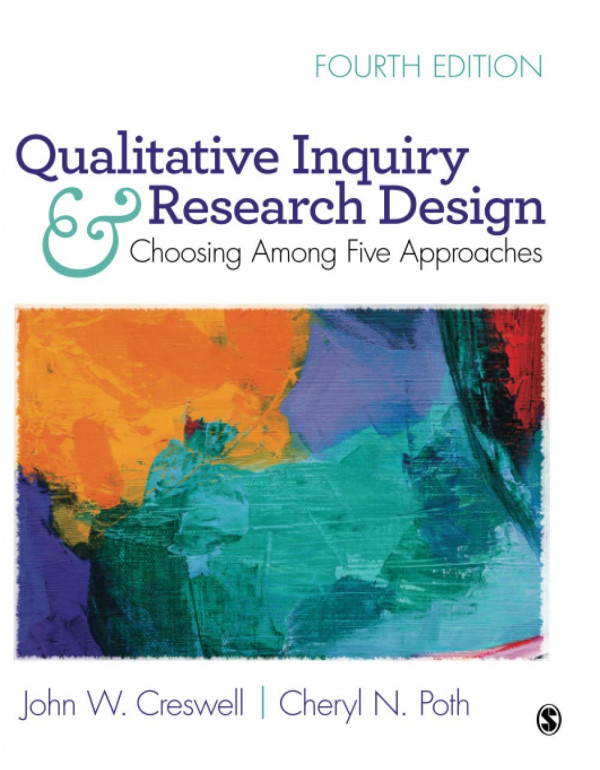In the revised Fourth Edition of the best-selling text, John W. Creswell
and new co-author Cheryl N. Poth explore the philosophical
underpinnings, history, and key elements of five qualitative inquiry
approaches: narrative research, phenomenology, grounded theory,
ethnography, and case study. Preserving Creswell's signature writing
style, the authors compare the approaches and relate research designs to
each of the traditions of inquiry in a highly accessible manner.
Featuring new content, articles, pedagogy, references, and expanded
coverage of ethics throughout, the Fourth Edition is an ideal
introduction to the theories, strategies, and practices of qualitative
inquiry.
Content -
1. Introduction
Purpose and Rationale for the Book
What Is New in This Edition
Definition of Qualitative Research
Selection of the Five Approaches
2. Philosophical Assumptions and Interpretive Frameworks
Situating Philosophy and Interpretive Frameworks Within the Research Process
Philosophical Assumptions
The Practice of Using Interpretive Frameworks in Qualitative Research
Linking Philosophy and Interpretive Frameworks in Qualitative Research
3. Designing a Qualitative Study
The Characteristics of Qualitative Research
When to Use Qualitative Research
What a Qualitative Study Requires From Us
The Features of a “Good” Qualitative Study
The Process of Designing a Qualitative Study
Ethics in Qualitative Research
The Design Structures of a Plan or Proposal
4. Five Qualitative Approaches to Inquiry
Deciding Among the Five Approaches
Phenomenological Research
Comparing the Five Approaches
5. Five Different Qualitative Studies
A Narrative Study (Chan, 2010; see Appendix B)
A Phenomenological Study (Anderson & Spencer, 2002; see Appendix C)
A Grounded Theory Study (Harley et al., 2009; see Appendix D)
An Ethnographic Study (Mac an Ghaill & Haywood, 2015; see Appendix E)
A Case Study (Frelin, 2015; see Appendix F)
Differences Among the Approaches
6. Introducing and Focusing the Study
Interrelating the Study Problem, Purpose, and Questions Within Research
The Research Problem Statement
7. Data Collection
The Data Collection Circle
8. Data Analysis and Representation
Ethical Considerations for Data Analysis
Three Analysis Strategies
Analysis Within Approaches to Inquiry
Comparing the Five Approaches
Computer Use in Qualitative Data Analysis
9. Writing a Qualitative Study
Ethical Considerations for Writing
Several Writing Strategies
Overall and Embedded Writing Strategies
A Comparison of Writing Structures Across Approaches
10. Standards of Validation and Evaluation
Validation and Reliability in Qualitative Research
Comparing the Evaluation Standards of the Five Approaches
11. “Turning the Story” and Conclusion
A Case Study: “Campus Response to a Student Gunman”
Appendix A. An Annotated Glossary of Terms
Appendix B. A Narrative Research Study—“Living
in the Space Between Participant and Researcher as a Narrative Inquirer:
Examining Ethnic Identity of Chinese Canadian Students as Conflicting
Stories to Live By”
Appendix C. A Phenomenological Study—“Cognitive Representations of AIDS”
Appendix D. A Grounded Theory Study—“Developing
Long-Term Physical Activity Participation: A Grounded Theory Study With
African American Women”
Appendix E. An Ethnography—“British-Born
Pakistani and Bangladeshi Young Men: Exploring Unstable Concepts of
Muslim, Islamophobia and Racialization”
Appendix F. A Case Study—“Relational
Underpinnings and Professionality—A Case Study of a Teacher’s Practices
Involving Students With Experiences of School Failure”

